#colorism
Text
Desi Parenthood, Adoption, and Stereotypes
I have a story set in the modern day with supernatural traces, with three characters: a young boy, his bio dad, and his adoptive dad. The boy and his bio dad are Indian, the adoptive dad is Chinese.
The bio dad is one of the few people in the story with powers. He put his son up for adoption when he was a child because at the time he was a young single father, had little control of the strength of his powers: he feared accidentally hurting his child. The son is adopted by the other dad, who holds spite to the bio dad for giving up his son since he lost his father as a young age and couldn't get why someone would willingly abandon their child.
This also results in him being overprotective and strict over his son. When the child is older, the bio dad comes to their town and the son gets closer to him, which makes the adoptive dad pissed, mostly acting hostile to the other guy, paranoid that he'll decide to take away the child he didn't help raise. Later when they get closer he does change his biases.
I can see the possible stereotypes here: the absent father being the darkskinned character, the light-skinned adoptive dad being richer than the bio dad, the lightskinned character being hostile and looking down on the darkskinned character, the overprotective asian parent, the adoptive dad assuming the bio dad abandoned the son. The reason for his bias isn't inherently racist, but I get how it can be seen that way. Is there a way to make this work? Would it be better to scrap it?
Two problem areas stand out with this ask:
You seem confused with respect to how racial stereotypes are created, and what effect they have on society.
Your characterization of the Indian father suggests a lack of familiarity with many desi cultures as they pertain to family and child-rearing.
Racial Stereotypes are Specific
Your concern seems to stem from believing the absent father trope is applied to all dark-skinned individuals, when it’s really only applied to a subset of dark-skinned people for specific historical/ social/ political reasons. The reality is stereotypes are often targeted.
The “absent father” stereotype is often applied to Black fathers, particularly in countries where chattel slavery or colonialism meant that many Black fathers were separated from their children, often by force. The "absent black father" trope today serves to enforce anti-black notions of Black men as anti-social, neglectful of their responsibilities, not nurturing, etc. Please see the WWC tag #absent black father for further reading.
Now, it’s true many desis have dark skin. There are also Black desis. I would go as far as to say despite anti-black bias and colorism in many desi cultures, if one was asked to tell many non-Black desis from places like S. India and Sri Lanka apart from Black people from places like E. Africa, the rate of failure would be quite high. However, negative stereotypes for desi fathers are not the same as negative stereotypes for non-desi Black fathers, because racially, most Black people and desis are often not perceived as being part of the same racial group by other racial groups, particularly white majorities in Western countries. Negative stereotypes for desi fathers are often things like: uncaring, socially regressive/ conservative, sexist. They are more focused around narratives that portray these men as at odds with Western culture and Western norms of parenting.
Desi Parents are Not this Way
Secondly, the setup makes little sense given how actual desi families tend to operate when one or both parents are unable to be present for whatever reason. Children are often sent to be raised by grandparents, available relatives or boarding schools (Family resources permitting). Having children be raised by an outsider is a move of last resort. You make no mention of why your protagonist’s father didn’t choose such an option. The trope of many desi family networks being incredibly large is not unfounded. Why was extended family not an option?
These two points trouble me because you have told us you are writing a story involving relationship dynamics between characters of both different races and ethnicities. I’m worried you don’t know enough about the groups you are writing about, how they are perceived by each other and society at large in order to tell the story you want to tell.
As with many instances of writing with color, your problem is not an issue of scrap versus don’t scrap. It’s being cognizant of the current limits of your knowledge. How you address this knowledge deficit and its effect on your interpretation of your characters and the story overall will determine if readers from the portrayed groups find the story compelling.
- Marika.
I have one response: what? Where are the father’s parents? Any siblings? Is he cut off? Is he American? A Desi that has stayed in India?
Estrangement is not completely out of the question if the father is Westernized; goodness knows that I have personal experience with seeing estrangement. But you haven’t established any of that. What will you add?
-Jaya
#Black#Indian#South Asian#Desi#absent black father#stereotypes#tropes#adoption#colorism#research research research#parenting#strict Asian parents#Asian families
470 notes
·
View notes
Text
The Queen has spoken:
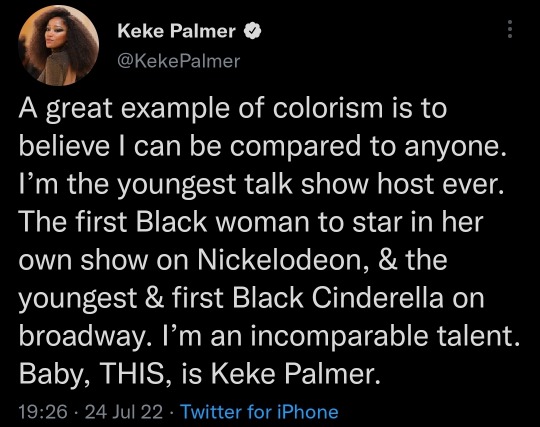
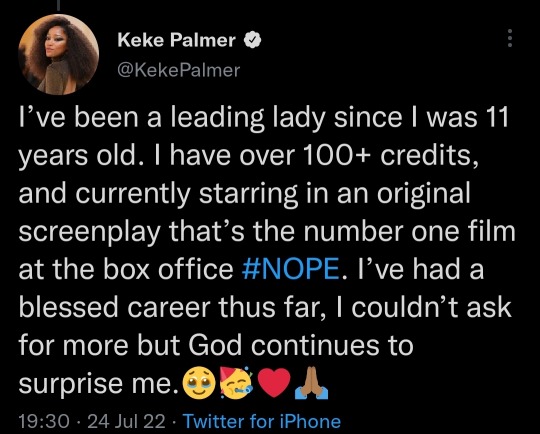
And that's that on that. Everyone, go see Nope!
#keke palmer#nope 2022#true jackson vp#nope#black actresses#colorism#i just saw there's a big thing with#people comparing her to zendaya?#Z is fantastic but#why#just stop
4K notes
·
View notes
Text
*sigh* Featurism...

So, I woke up to this shit on the Twit app and I've only hit on this issue before, but today I'm digging in.
Colorism is something that is not addressed often enough, but intersected within that and even more rarely spoken about, is the issue of featurism.
The young actress above just got cast as Juliet in the latest big staged prestige production of Romeo and Juliet, opposite Tom Holland. And as usual the blue-checks, everybody else including "black", and even Black regulars are all-in on the cruelty.
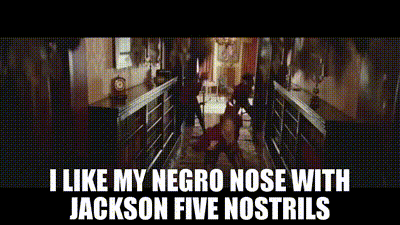
...But I want to breakdown a nuance that is too often skipped over when this happens. The two people named with her, give away the featurism game, here; a particularly nasty form of often internalized racism.
I guarantee if the young actress looked like this?
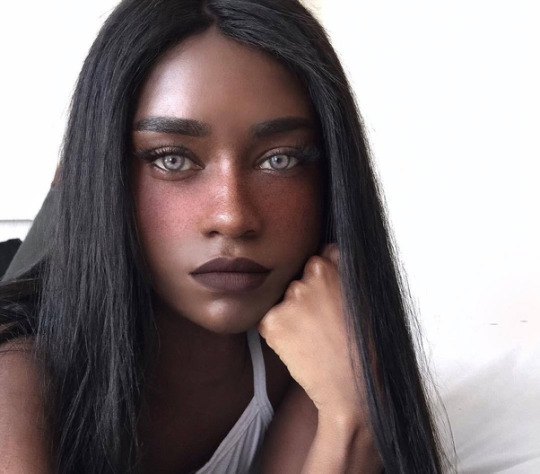
She'd definitely still get racist attacks, but the particularly nasty shit I'm seeing attacking her looks wouldn't come. In fact, I could see some people thinking they are defending her with "but she's pretty!" or more specific... "obviously she's mixed" comments.
-Something pretty much every Black woman with features that don't align with a narrow perception of blackness hear often (and we'll get to why I specified women in a minute).
And don't get it twisted...
These aren't exclusively nor standard white features either (see: the many ethnic features w/in white ethnic groups that also get hit to a lesser and non-racialized degree such as large "hook" and/or Romanesque noses for example, which is definitely about anti-semitism, anti-Romani sentiment, and other disparaged/discriminated against ethnic minorities in Europe) and yes, blue eyes are naturally occurring within non-mixed and dark-skinned Black people due to a mutation called Waardenburg syndrome.
But there is a REASON why fetishizing even certain ethnic features within the African continental diaspora has been a thing for a long time...i.e. "the dopest Ethiopian" from the Tribe Called Quest lyric is pictured as this:
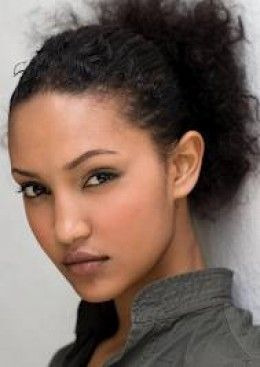
and this:

and not this:
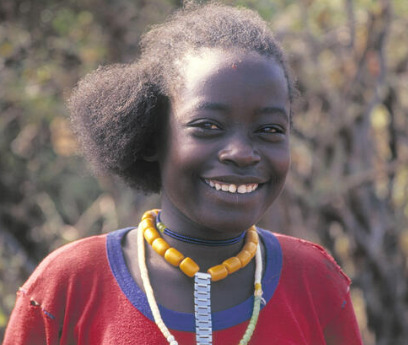
...despite them all being Ethiopians of various tribal ethnicities.
A wide-nose, a tighter curl, coil, or zig-zag pattern of hair, fuller lips and often, but not always (because I've given examples above where features "mitigate" skin color) darker skin.
Zendaya is grouped with Tracey and Francesca Amewudah-Rivers, despite being both lighter in skin color and having a Black parent and a white parent because her nose isn't what has become the standard surgical look...that too many celebs have.
This includes the ones who got so-called "ethnic" work or just a slight 'refinement'. No, her nose is born w/it, made for that good African air, as I call it. Nostrils prominent, nose bridge wide:
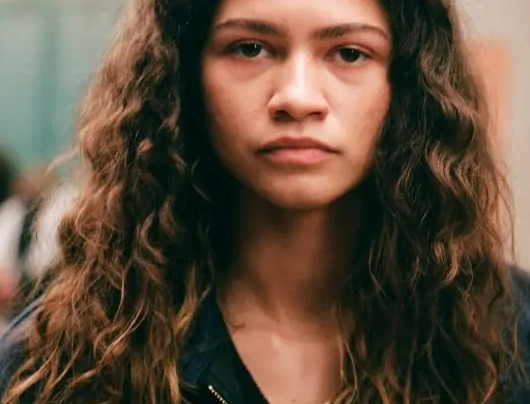
I went make-up free as well, because even make-up practices these days, go for that narrowing highlight technique i.e. just below it's subtle.
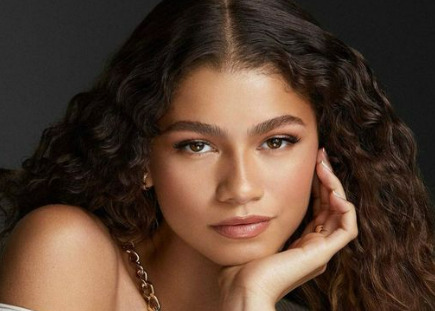
Sza is a an example of it taken to extremes, even with the Hollywood standard "ethnic" refinement she did get.

The thing is... I don't blame or attack her for that. Because you see above that is just a taste of what happens.
Lil' Kim was relentlessly bullied by the men in her life for her ethnic features for her whole life...and that is why she is off-limits to this day for me when it comes to all the work she's had done.
...And this is where I explain why I specified men being mostly exempt. It's because "Blackness" including all the physical features associated with it, is by default masculinized.
...Which is why Idris Elba is considered one of the most handsome men in the world, w/o the caveats that even Lupita Nyong'o often gets.
Nobody calls Samuel L. Jackson ugly. He is even idolized and fetishized by a specifically white male gaze for how culturally "Black" he is perceived to be for all the wrong reasons, his signature "motherfucka" for example (and I could go off on a whole other tangent here, but digressing).
All this to say... Featurism sucks. It's not talked about enough.
Blackness in all variations is Beautiful.
Tracy Chapman looking as young she does?? Hell, mark it down to both her dark skin (a natural UV protector) and not messing with her given features (and being a lesbian, men will age you. lol -I got jokes-):

P.S. THANK GOODNESS for Tems and her rising prominence as a beauty as well:


P.P.S. Even Jay-Z the billionaire rapper has had the comments over the years about his lips and nose, hence that lyric in Beyonce's Formation.
#featurism#I only just scratched the surface#but man this shit needed to be scratched#colorism#racism#meta#tom holland#romeo and juliet#tracy chapman#lil kim#tems#jay z#sza#zendaya#francesca amewudah-rivers#francesca amewudah rivers
220 notes
·
View notes
Text
Dark Skinned Black Girls,
It’s ok. I know it’s a nightmare; every single day. Every single second. But please don’t stop existing. You deserve a quality of life. You’re not different from other races of women. You’re not broken. You’re not unwanted. You’re not undesirable. You are NOT, obsolete. And it’s okay to be exhausted. You owe the world and humanity nothing. Absolutely nothing. Know that. You’ve always been yourself. Whether discriminated against, accepted or emulated. You’ve always been you. You deserve good things. You deserve better. You deserve best. You deserve peace. You deserve sanctuary. You deserve to thrive.
In spite of everything you’re put through.
#black tumblr#black twitter#black women#black girls#misogynoir#antiblackness#blm#black girl magic#protect black women#protect black girls#dark skin#colorism
604 notes
·
View notes
Text
How many Ls can one person take
#talkin#tik tok#beans and toast niggas#uk#britain#colorism#delusional#black americans#black americna culture
539 notes
·
View notes
Text
On colorism:


#yes leguizamo is antiblack. its old news#john leguizamo#antiblackness#colorism#afro latino representation#colman domingo
211 notes
·
View notes
Text


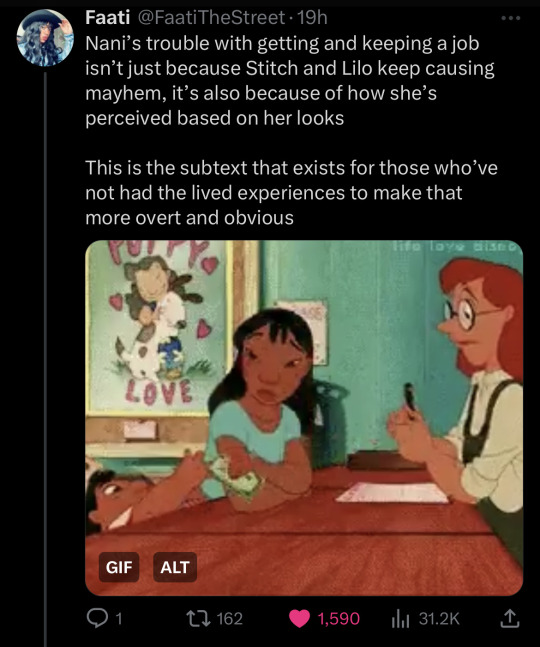
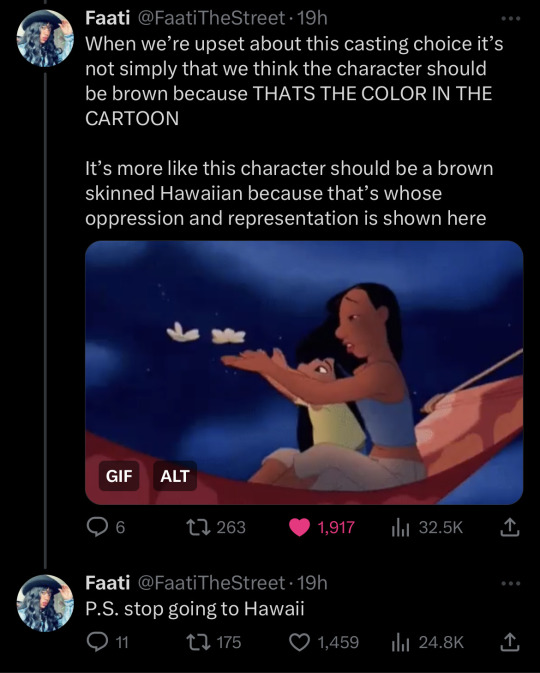
This is different.
644 notes
·
View notes
Text
Globally it’s a problem . White supremacy really did a number on us throughout the world . Our mentality is so deep with white supremacist ideas
125 notes
·
View notes
Text
That scene in Bed Friend is really hitting me in my COLORISM RUINS EVERYTHING BECAUSE LOVERS WITH CONTRASTING SKIN TONES ARE THE SEXIEST THING ON THE PLANET spot. Let the melanated characters (and actors) get loved on ON GOD.
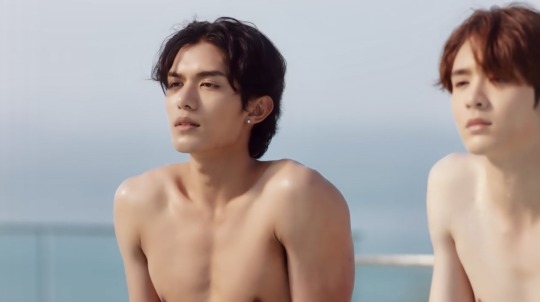

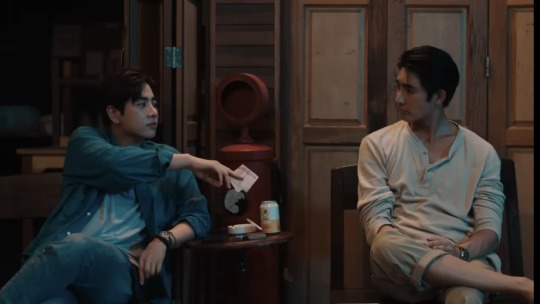
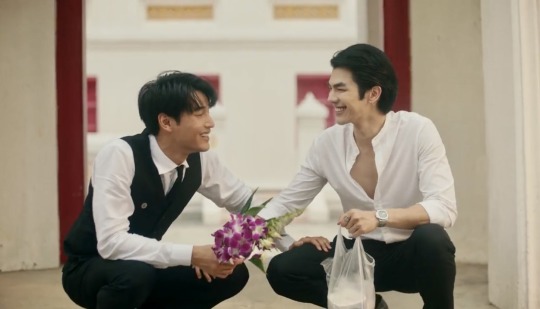
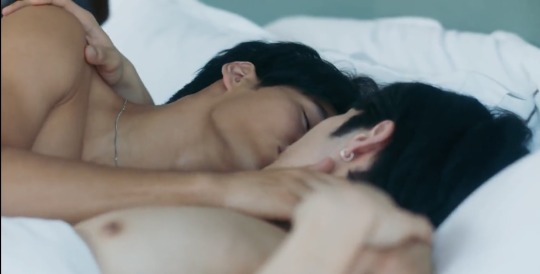

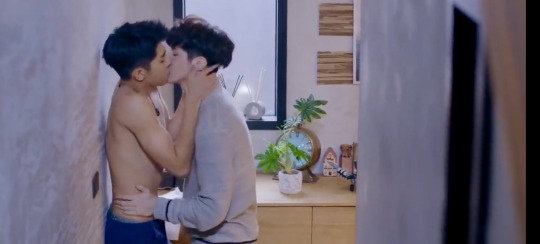


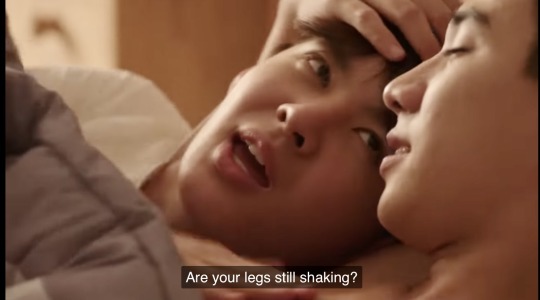
#bed friend#bed friend the series#netjames#moonlight chicken#earthmix#kinnporsche#mileapo#history 4: close to you#history 5: love in the future#big dragon#mosbank#love by chance#perthsaint#colorism
647 notes
·
View notes
Text
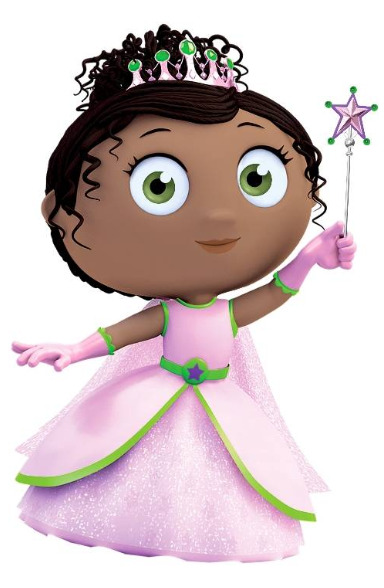
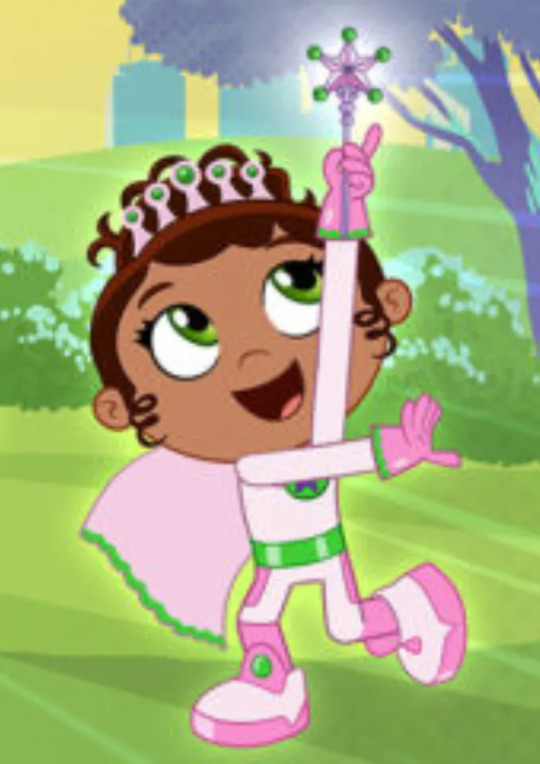

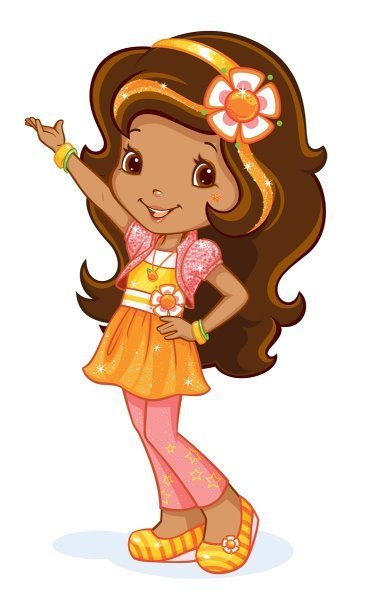

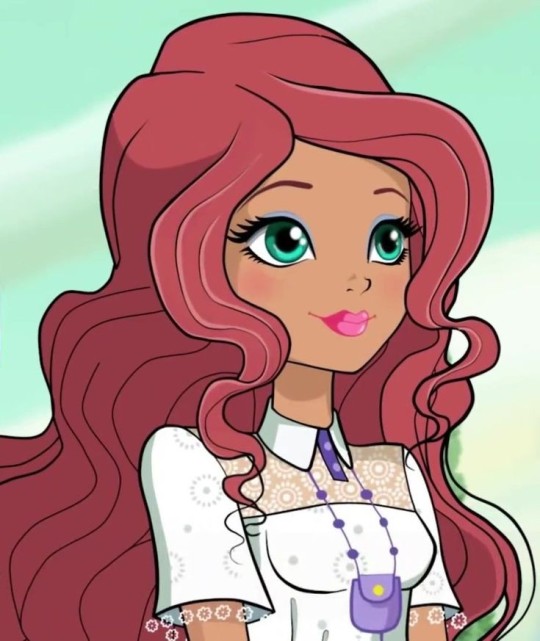
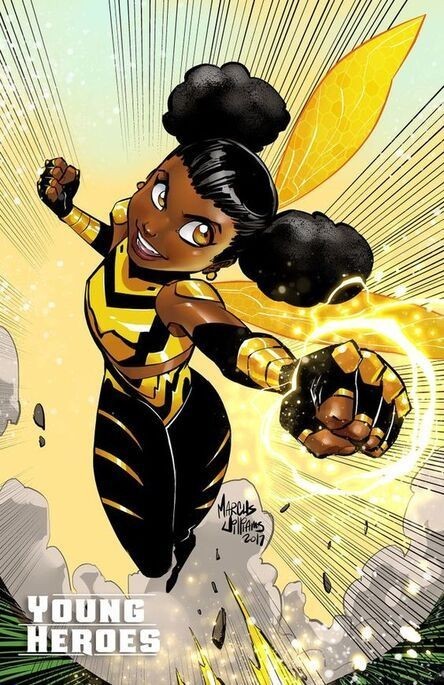
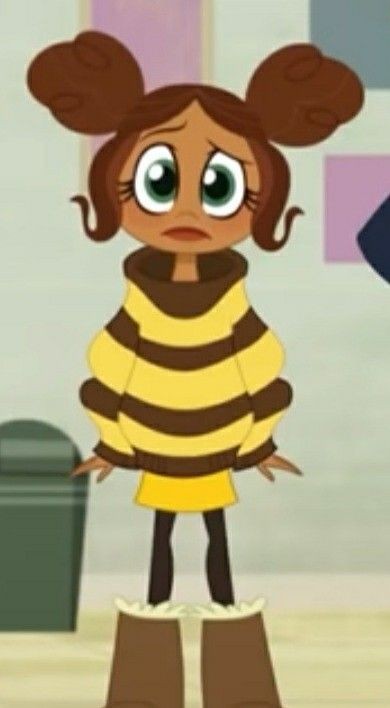
Please stop doing this to us
#my fyp#cartoons#whitewashing#bumblebee#orange blossom#aisha#winx club#winx#super why#princess pea#colorism#colorism is horrible
159 notes
·
View notes
Text
Mattel… come on.


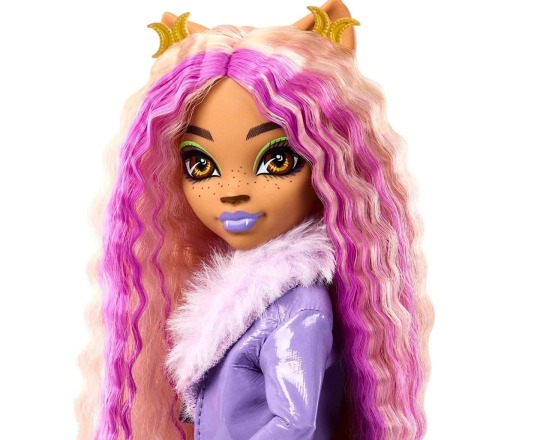
If you’re gonna make her the main character, at least try to keep her skin tone consistent this time for fucks sake.
And darker.
She’s nearly Howleen’s skin tone now 💀.
-
ID- “One picture of a Gen1 Clawdeen doll, and two pictures of two different Gen2 Clawdeen dolls. The first doll is a stock photo of an OG Clawdeen doll, the second is a stock photo of Gen3 Clawdeen’s signature doll, and the last photo is a closeup stock photo of Gen3 Clawdeen’s ‘Skulltimate Secrets’ doll,”- END ID.
#monster high#clawdeen wolf#yes I’m still mad over this shit#it’s ridiculous#the company can make dark skinned Barbie’s#but heaven forbid they make a darkskin doll for the brand people actually care about#colorism
1K notes
·
View notes
Text
“Yeah, I mean, in 2018 was the first Shakespeare and race festival that I curated at the Globe. And at that time, there was less vitriol, but it was more like, why are we talking about Shakespeare and race? Shakespeare's got nothing to do with race.
So that led me to thinking about writing this book. But it was in 2020, when I launched the anti-racist Shakespeare webinars, that there was a horrible backlash, very racist backlash. And my own ethnic origins were brought into the conversation.
Oh, she's a woman of color. That's why she's talking about race. And actually, I had been at the Globe for 17 years by that point, you know?
And so that backlash is about ownership. It's about people feeling that something is being taken away from them.
And after the Black Lives movement, Black Lives Matter movement went global, and organizations like museums and galleries and theaters started to take it seriously, that's when you started to see a really racist backlash against any kind of progressive movement, whether it's in a theater or a museum. And I certainly had to face that in 2020.
I was a little bit worried about it, probably more so in the UK, because I think in the UK there's a special sense of ownership of Shakespeare in the way that there isn't in the US. So I'm American, but I'm also a Pakistani. And so I think it was really, it's a double whammy for the British.
Whereas in America, I feel like I was less worried because Americans don't mind other Americans talking about Shakespeare. So I was in the UK, concerned about that. But I think it obviously didn't stop me because what I'm trying to do is keep Shakespeare around.
And I'm explicitly not advocating canceling Shakespeare. And I think that's what they all thought I was doing when I was running those webinars.
So Shakespeare sets Othello in 16th century Venice, which was a very multicultural society because Venice was a sort of trading giant in this time period. So it was really financially lucrative for them to have people from all backgrounds working and living in Venice. And so it's about a Black African, known as a Moor in that time period, who was the captain of the Venetian army.
And it starts with another member of the army sort of screaming and shouting outside the door or window of a fellow's now father-in-law saying that, basically shouting a lot of racist epithets about how his daughter, his white daughter, has married a Black man. And she's done so without her father's consent. So it starts with this idea of there's been some sort of violation.
A Black man has married a white woman, and this is a problem.
So it ends up at the court of the Duke who is dealing with other issues because the Turks are now circling around their outpost in Cyprus, and they need Othello to do some work for them and to fight off the Turks. So the Duke says, oh, look, it's okay. It's fine. You know, Othello is a great guy. We've all worked with him. We know him really well.
And that's when the line comes out: He is far more fair than Black.
And what he's saying there is that essentially, look, he doesn't act Black. He acts white. He acts like us. So let's just be okay with this.
And so what you have there is a situation in which somebody who has kind of violated a kind of racial code in Venetian society is given a pass because he's very useful to that society. What happens in the rest of the play is that lago works on him and tries to convince him that his wife is having an affair with his lieutenant.
And unfortunately, Othello believes him, and they plot to murder Desdemona, and they do. He does. And it's a heartbreaking, heart-wrenching play.
And what's difficult about it is that it seems to fulfill stereotypes about Black men and Black masculinity. So it's always been a bit of a problem to stage. So yeah, it's a fantastic play, though.
It's a real sort of exploration of interracial relationships in a white-dominant society.
Yeah, I think it's harder in classrooms. And that's something that I actually been thinking about how to address a colleague of mine, and I've been discussing it. Because a lot of teachers, especially white teachers, aren't necessarily equipped to have a conversation about race that isn't going to make all the students in the room feel objectified or uncomfortable.
And so what I'm trying to, what I also get at the book is about discomfort, being able to lean into the discomfort of having conversations. And Shakespeare, for him, he was an advocate of discomfort. You were not comfortable when you went to see a Shakespearean tragedy.
He didn't want you to be.
And so we should try and be comfortable in the classroom. And there are productions who have tried very hard to lean into the racial tension and angst in the play.
But often it can be unsuccessful, particularly if it's a white director that sees too much optimism in the play. And says, oh, this play really, it's not about race. It's about redemption of characters who've been singled out for some reason.
I'm like, well, the reason is race.
My goal was always to show how it rears its head, even in the moments that are the most unexpected or that seems innocuous.
But what is interesting is that in a lot of his comedies, he's using anti-Black racism as a source of humor. And, you know, that would have made people laugh, some of the comments that you hear in some of his most delightful comedies. And because the racism isn't the undercurrent of the play, that it's easy to miss it.
So you'll just get all of a sudden a comment like Much Ado About Nothing, where the character Benedict is talking with his friend Claudio about a woman that Claudio has a crush on. And he says, oh, she's too brown for a fair praise. And that would have made people laugh.
What he's saying is that she's not attractive enough to praise her, and fair in that time was a very elite form of whiteness. It meant beautiful and virtuous and white with a luster or a shine, and that shine is the virtue of a woman. And no woman of color could ever achieve that, because she's not white enough.
So he's saying that this woman is too brown, even if she's not brown, but he's using brown as a way of denigrating people of color.
But I think Shakespeare is still valuable for us because of the contemporary nature of some of the issues that he raises in his plays.
I mean, there's a great speech in Midsummer Night's Dream where he talks about the destruction of the planet because of the way people are behaving towards each other. And the powerful resonance of that today just is unmissable. So Shakespeare is able to articulate or help you to think about questions that are so urgent in your own moment.
I think other writers need to be brought into dialogue with Shakespeare. If you teach Othello, teach Toni Morrison's Desdemona, right?
It's incredibly lucrative intellectually and emotionally to keep Shakespeare in the curriculum.”
—Farah Karim Cooper: Director of Education at Shakespeare's Globe Theatre, and author of The Great White Bard, How to Love Shakespeare While Talking About Race
#shakespeare#farah karim cooper#othello#racism#ingrained racism#casual racism#writing#much ado about nothing#colorism#the merchant of venice#anti blackness#desdemona#blacklivesmatter#theatre
55 notes
·
View notes
Text
one conversation in particular that annoys me is when black women try to have an honest discussion about how they felt undesired, unprotected, and mistreated by the men of our own race and it’s followed by: “y’all need to just go outside. Black men like black women still.” which is funny because I can promise you my (and every other black girl’s) very first experience with colorism and self hating men was not with some random nigga on Twitter or a boy on TikTok bashing us for views.
it was in my fourth grade class when my only other black classmate was mixed and his white mom told him girls like me weren’t cute. That I was too ‘black’ and ‘nappy headed’ despite her husband being my same shade.
it was in my middle school years when the same three boys tormented me constantly, from making fun of the skin tags on my face to my skin tone (even though one was darker than me) even sitting behind me and calling me ugly every chance they got while uplifting lighter skin and non-blk girls. Running to tap on my shoulder to yell ‘he likes you’ only to run away laughing as some sort of insult.
it was in my sophomore year and I moved to a predominantly yt high school, where the handful of blk boys didn’t even look in my direction and when they did, it was only to help get the attention of my nb friends. Or when a guy tried to attack me and my whole group of friends one more and I was the only one not protected because I was ‘strong enough to fight for myself.’ While they jumped to the aid of the white girls. and when the non-blk boys paid me attention, it was only to fetishize or tell me how I was ‘pretty for a black girl’ and that they’d ‘date me if their parents would approve but knew they wouldn’t.’
it was even older men would hit on me and when I’d turn them down, I’d be told I should be ‘lucky somebody likes my black ass.’
I had to learn from a very young age that this world does not view nor respect us and I didn’t do so from behind a screen. We’re just in an age where we have a platform to collectively voice our opinions and share our experiences in hopes to not only help others but heal and speak about it. So rather than gaslighting and trying to quiet us under the premise that we’re ‘too sensitive’ or ‘chronically online’ try this nice little thing call shutting the fuck up and listening to us. It’s a lot of guys I went to school with who are or have already become fathers and they’re gonna have black children (mixed race or not). Raising sons to think that type of treatment of girls is okay and a daughter who’s going to go through that thinking it’s just a part of growing up. We don’t talk about these things because we want half-assed sorry apologies or to even bash black men. We do it because we want the cycle to stop because no little black girl should feel less than her worth, especially at the hands of the ones who should be looking out for us.
#cherry chats 🍒#just a lil thought#sorry to start my Sunday off with a rant but hey#tw vent#colorism#black girl blogger#this has been on my mind for a few days#Twitter would get so offended by this so I’ll post here with the girlies
357 notes
·
View notes
Note
One thing that bothered from the first THG movie when I was a kid is that Thresh and Rue were described as having the same skin tone. But in the movie, Rue was significantly lighter, and Thresh had darker skin.
Now, that used to bother me for not being "Book accurate" when I was like 11 or such. But now I think of like
"Huh, having the light skinned girl being the symbolic and meta-textual representation of goodness and innocence in the Arena and the tall dark skinned boy being the one who kills someone mercilessly with a rock was a choice with Implications I'm not really a fan of..."
(I might be overthinking it cause I'm white passing and not that smart, but let me know your thoughts)
Hey don't talk about yourself like that!!! It's absolutely an example of colorism. (something that amandla has been taking advantage of throughout her career no less). like for example in the hate you give she's substantially lighter than her book counterpart
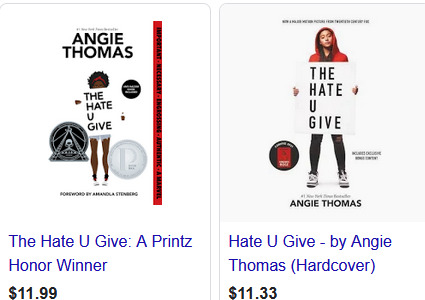
you can see it in the differences in these 2 book covers. the one on the left is the original cover and as you can see she's much darker than amandla on the right.
so going back to thg here's thresh's actor
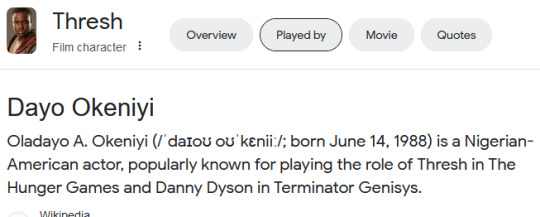
let's zoom in on him

now here's amandla

so yeah this was a deliberate choice on the part of the casting directors. and it absolutely is an example of lightwashing/colorism.
mod ali
113 notes
·
View notes
Text
A lot of y’all need to understand that colorism is not a two way street just like how racism isn’t a two way street, especially when it comes to representation in a lot of different media. Some of y’all saw when I got jumped by the lightbright brigade for simply saying that Storm is dark skin and should be portrayed that way. The same goes for other characters. It should not be up for debate. When y’all are doing your fancasts/face claims and the character is explicitly stated to have dark skin or that is literally how they’re drawn there should not be lighter actresses/actors in your lineup. At all. A lot of y’all also need to learn how light works on dark skin cuz those whitewashed drawings of Miles Morales from like a month ago were absolutely atrocious. You had ppl making every type of excuse simply cuz they didn’t want to be wrong or they simply didn’t care. If you immediately become hostile when being corrected for this then you simply do not need to interact with media that has dark skin ppl in it. Like ever.
#representation matters#correct representation matters#whitewashing#there’s really no excuse for it#it’s ignorance#miles morales#across the spiderverse#ororo munroe#x men storm#princess tiana#princess and the frog#colorism#legendborn#bree matthews#unique writes
167 notes
·
View notes
